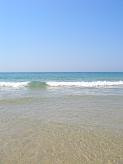Welcome to our weekly Marine News Roundup, bringing you the best marine stories of the week!
"The Strangest Creatures on Earth"
BBC Earth have revealed their top six strangest creatures on Earth, with the Wolf Eel at number 1 and the Giant Candiru - "a bizarre flesh eating parasitic fish that lives inside the Amazonian Catfish and makes the local piranhas seem positively tame", at number five! The BBC also have some lovely underwater videos, so make sure you take a look.
"New Zealand's lost penguin sets sail for home"
In mid-June, an Emperor Penguin was found on a beach in Wellington, more than 1,900 miles from his home in the Antarctic. He was weak and emaciated and needed surgery to remove sand and sticks from his stomach before being fed-up on a diet of fish milkshakes. The penguin, nicknamed "Happy Feet", has been recuperating for two months at Wellington Zoo but has now set sail for home in a custom-made crate. He will be released into the Southern Ocean, where it is hoped he will rejoin other Emperor penguins before making his way back to Antarctica. Good luck, Happy Feet!
"Hundreds of baby sea turtles lose their lives after Hurricane Irene"
In Florida, hundreds of baby sea turtles have been unearthed by Hurricane Irene, with higher waves and erosion affecting the chances of survival of eggs and hatchlings alike. The public are being advised to take any hatchlings not near the water to approved turtle rehabilitation centres.
"Scientists call for better management of the deep sea"
A recent study by a team of twenty researchers from all over the world has found that the deep sea (waters deeper than 200m) is being damaged by human activities. Exploitation is currently the number one problem, but climate change and dumped waste also play their parts. Scientists are now calling for better management and conservation of entire deep-sea ecosystems, which cover 360 million square kilometers - around half of the Earth's surface.
"Red grouper returns to menus as population rebounds"
The population of Red Grouper in the Gulf is back to healthy levels after years of federal management of the fishery. Grouper fisheries were closed in 2005 and grouper fishermen worked with the federal agency to create a program modelled on one used in 2005 to manage Red Snapper. The Red Grouper population is now strong enough that the NOAA's National Marine Fisheries Service plans to increase the maximum amount commercial fishing operations can haul from the water to 5.2 million pounds, up from the 4.3 million it established at the beginning of 2011.
"Female seals drawn to deadly ship propellers because they sound like male mating call"
Experts at the Sea Mammal Research Unit at St Andrews University believe that female seals that have suffered mysterious "corkscrew" injuries have been drawn into ship propellers because the blades produce the same acoustics as a male seal's mating call. Acoustic tests carried out on both captive and wild seals seem to back-up the theory. The number of deaths from corkscrew injury has risen to 90 this year. It is hoped that, if the type of propeller making the noises can be identified, then it can be changed and these types of death avoided in future.
"15 Irrefutable Signs That Climate Change Is Real"
"From rising air and ocean temperatures to shrinking glaciers and widespread melting of snow and ice, evidence of a changing global climate is all around us." The article includes sign 4 - "Average Arctic temperatures have increased at almost twice the global average rate in the past 100 years." - and many others.
"Great white sharks 'could be in British waters'"
The chairman of the Shark Trust, Richard Peirce, has said that Great White sharks could be, "occasional vagrant visitors" to waters around the British Isles. He said that it is surprising that we do not have an established Great White population in our waters as the conditions here mirror those in parts of South Africa, Australia and northern California and the sea temperature here is within the tolerable range for Great Whites. British waters are already home to several species of predatory shark, including Mako and Blue sharks.
"Marine species discovered on Gorringe seamount"
International marine conservation organisation Oceana have discovered more than 100 marine species on the Gorringe seamount in the Portuguese Atlantic. Oceana have called for greater protection of the biodiverse area, which is home to spotted dolphins, Minke whales, sea pens, slipper lobsters, dense kelp forests, deep-sea sponge fields, black coral, extensive oyster beds and an array of fish, including orange roughies, longspine snipefish, morays and conger eels.
"Cuttlefish decline prompts extended protection zone"
Critically low numbers of giant cuttlefish have been found in the upper Spencer Gulf in South Australia this season - just 25,000 compared to 250,000 in the past. Whilst scientists try to find the reason behind this, a protection area has been expanded and it will now be illegal to fish for cuttlefish or squid within the area. Whilst the additional protection is a temporary measure, the area previously protected is being made permanent. A monitoring program will also ensure there is comparable data over the years.
And finally, not a news story as such, but we came across The Daily Ocean blog recently and wanted to share a heart-warming humpback whale rescue video that is featured on the blog. Enjoy.
Thursday, 1 September 2011
Marine News Roundup
Labels:
BBC Earth,
Climate Change,
Cuttlefish,
Deep Sea,
Fish,
Fisheries,
Global Warming,
Hatchlings,
Humpback Whale,
Hurricane Irene,
Penguin,
Red Grouper,
Seals,
Seamount,
Sharks,
Turtles
Subscribe to:
Post Comments (Atom)

No comments:
Post a Comment